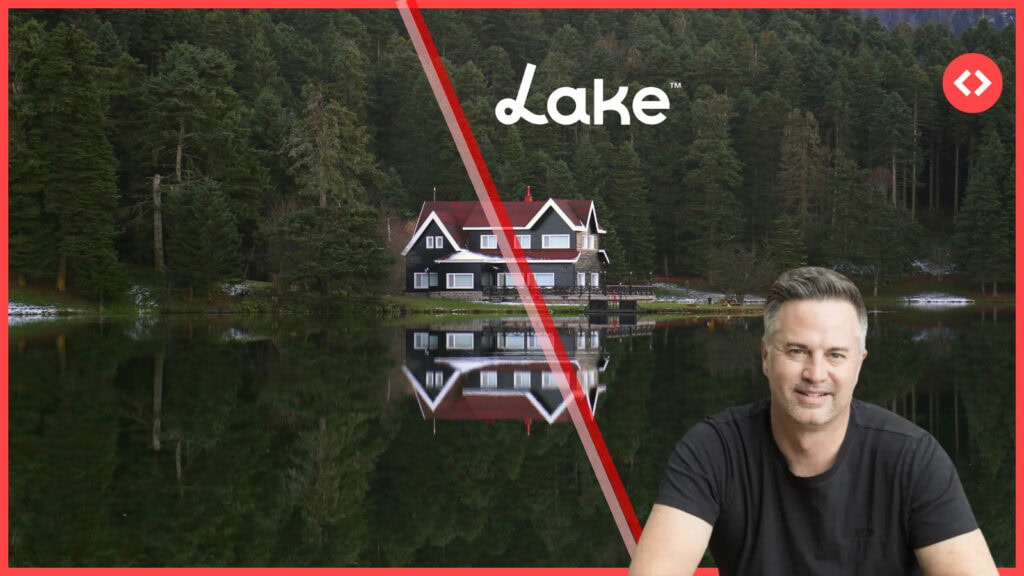What does it take to build not just a new company, but an entirely new subcategory of short-term rentals? To understand that, we sat down with David Ciccarelli, Co-Founder and CEO of Lake.com, an emerging online booking platform dedicated entirely to lakefront and lake-adjacent vacation rentals.
What emerged is not just the story of a niche Online Travel Agent (OTA), but a preview of the next era of distribution, shaped by AI-driven search, structured content, and conversational trip planning.
This article breaks that strategy down through the lens of what actually matters to professional short-term rental manager.
Why Lake.com Exists: A Category Born From Personal Experience
For David and his co-founder Stephanie, Lake.com started with a very practical problem.
After selling their previous tech company, they purchased a lake house north of Toronto. When hosting family reunions, they ran into a challenge familiar to many travelers: the big OTAs simply did not surface the kind of lake-specific properties they were looking for. Even nearby hotels were priced at $700–$800 a night during peak season, an impractical option for groups.
This mismatch sparked a question:
“What if we could take our years of experience building online marketplaces and apply it to vacation rentals?”
—David Ciccarelli
Speaking to local tradespeople, they discovered a pattern: thousands of lake homes sat empty most of the year, maintained year-round but rarely used. Some families even sold generational homes because the upkeep and taxes became too much.
This was both a guest problem and a homeowner problem, and the starting point for Lake.com.
Why Lake.com Resonated Immediately With Professional Managers
Most PMs avoid new distribution channels because the operational cost is too high: manual updates, unreliable syncing, weak integrations, and uncertain visibility. Lake.com accidentally solved this very early.
After opening sign-ups, the team noticed that nearly all the interest came from professional managers, not individual homeowners. This single insight reshaped the company’s first 18 months.
Instead of chasing individual hosts, Lake.com focused entirely on PMS connectivity, building commercial partnerships and full API integrations with systems like Hostaway, Hostfully, OwnerRez, and Lodgify, with more on the way. The result is a platform where a PM’s rates, calendars, and property details sync instantly and reliably, without manual channel management.
For PMs, this turns Lake.com from “another platform to babysit” into a low-lift channel worth testing.
A Niche Platform With Demand Tailored to PM Inventory
Lake.com isn’t trying to compete with Airbnb or Booking.com on breadth. Instead, it lists properties only within roughly 15 minutes of a lake, a boundary drawn from the founders’ lived experience growing up around the Great Lakes.
This sharp vertical focus does more than clarify brand identity. It naturally shapes the kind of travelers the platform attracts. Guests searching for lake stays often book larger homes, travel with extended family or groups, stay longer, and generate higher average daily rates.
This aligns almost perfectly with the 3–6 bedroom homes many PMs manage. While generalist platforms bring a broad mix of travelers, Lake.com’s niche produces a demand profile built for mid- to high-value inventory.
Where Lake.com Is Betting Big: AI Visibility, Not Traditional SEO
This is where PMs should lean in closely.
Traditional SEO is no longer the primary battleground for visibility. With Google’s AI Overviews, Perplexity, ChatGPT, and other AI systems now answering questions directly — often without showing traditional search results — visibility increasingly depends on whether your content is machine-readable, not just keyword-rich.
Lake.com has quietly built one of the most structurally AI-friendly platforms in the vacation rental category.
Structured data at scale
On more than 7,000 destination pages, Lake.com uses schema markup: structured, invisible code that tells AI tools what a page contains. Instead of parsing long paragraphs, AI systems receive clean, labeled data such as coordinates, lake characteristics, amenities, and nearby attractions. This kind of structure is critical because large language models rely on high-confidence, well-organized information to generate accurate responses.
Natural-language FAQs designed for AI
Lake.com also writes natural-language FAQs based on real traveler questions, a strategy often referred to as AEO (Answer Engine Optimization). Examples include:
- “Is this lake safe for swimming?”
- “What kind of fish are here?”
- “Can I tie my boat to the dock?”
These questions map directly to how travelers now speak to AI tools.
AI-assisted data enrichment
Instead of manually collecting geodata for thousands of lakes and destinations, the team used GPT via API to generate accurate location and metadata fields, work that would have taken months manually.
Why this matters for PMs
Your future visibility, whether on OTAs or your own direct booking site, will rely on structured, complete, and machine-readable property content. Minimal listing descriptions won’t be enough. AI systems do not infer missing details; they simply skip you.
Lake.com’s approach offers a preview of what all PMs will eventually need to implement.
The Biggest Shift in Guest Behavior: From Filters to Sentences
For over a decade, travelers searched using the familiar sequence:
Where → When → Who → Filters
That paradigm is disappearing.
Today, guests often describe their full trip needs in a single, natural-language request — sometimes 40 to 50 words long. This is the behavior increasingly referred to as “the what box”, because travelers no longer fill out fields; they simply explain what they want.
Tools like ChatGPT, Google AI Overviews, Perplexity, Booking.com’s AI Trip Planner, and Expedia’s ChatGPT app already support this. Airbnb has also announced upcoming conversational search features.
Lake.com is adapting early
The company is building a conversational search assistant that lets guests describe their trip naturally, and returns matching lakefront properties directly in a chat interface. This removes the friction of filters and mirrors how guests increasingly search in AI tools.
Why PMs should care
Because this behavior is going to define search across all platforms.
Direct booking websites, OTAs, and AI tools will all lean on natural-language interpretation. This means your listing descriptions and amenities data must evolve beyond keyword stuffing into clear, specific, intent-friendly content.
Preparing for the Next Big Distribution Channel: AI “App Stores”
OpenAI has effectively begun building an AI “app store.” Inside ChatGPT today, Booking.com and Expedia already have apps that allow users to search for stays, refine results, and, in some cases, begin booking.
This signals a future where travel discovery and booking will increasingly occur inside AI platforms, not just on websites.
Lake.com wants to be part of that first wave
David’s team is already developing a prototype booking assistant built specifically for these environments. As soon as OpenAI or Google allows third-party travel companies to publish full booking apps, Lake.com plans to meet users inside those conversational ecosystems.
The iPhone analogy
David compares this moment to the early days of the iPhone:
- At launch, Apple controlled all apps.
- When the App Store opened, third-party developers flooded in.
- That shift unlocked new revenue streams and fundamentally reshaped consumer behavior.
He believes AI platforms — ChatGPT, Google AI, Apple Intelligence — are approaching the same inflection point. Early movers will win disproportionate visibility.
Why PMs should care
Just as early Airbnb adopters benefited from a generational shift in travel behavior, early adopters of AI-driven distribution will benefit in the coming years. This will create new visibility channels beyond OTAs, and PMs who prepare early will be in the best position to leverage them.
Where AI Didn’t Work: A Useful Reality Check
Of course, not everything worked perfectly.
When Lake.com used AI to generate FAQ responses at scale, they encountered predictable issues: inaccurate lake information, placeholder text such as “error” or “data not found,” and even hallucinated details.
The solution was simple but essential: a human-in-the-loop editorial review process before publishing. AI accelerates the work but cannot replace quality control.
For PMs, this is an important reminder. The industry is flooded with automated content tools. Some are useful; many are not. Accuracy still matters, and your listing content should reflect that.
What Lake.com Really Signals for Professional PMs
Lake.com is not just another niche OTA. Their strategy reflects the broader transformation happening across STR distribution, one where:
- AI-driven discovery replaces traditional keyword search
- guest intent becomes the search box
- structured, machine-readable content determines visibility
- AI ecosystems become booking channels
- high-value vertical platforms outperform generalist ones
For managers with significant portfolios, the takeaway is clear:
The platforms built for the AI era will outperform those built for the SEO and filter era.
Lake.com’s story isn’t just about lake houses. It’s about how the infrastructure of STR discovery and distribution is being rebuilt, and what PMs need to prepare for next.
Uvika Wahi is the Editor at RSU by PriceLabs, where she leads news coverage and analysis for professional short-term rental managers. She writes on Airbnb, Booking.com, Vrbo, regulations, and industry trends, helping managers make informed business decisions. Uvika also presents at global industry events such as SCALE, VITUR, and Direct Booking Success Summit.









